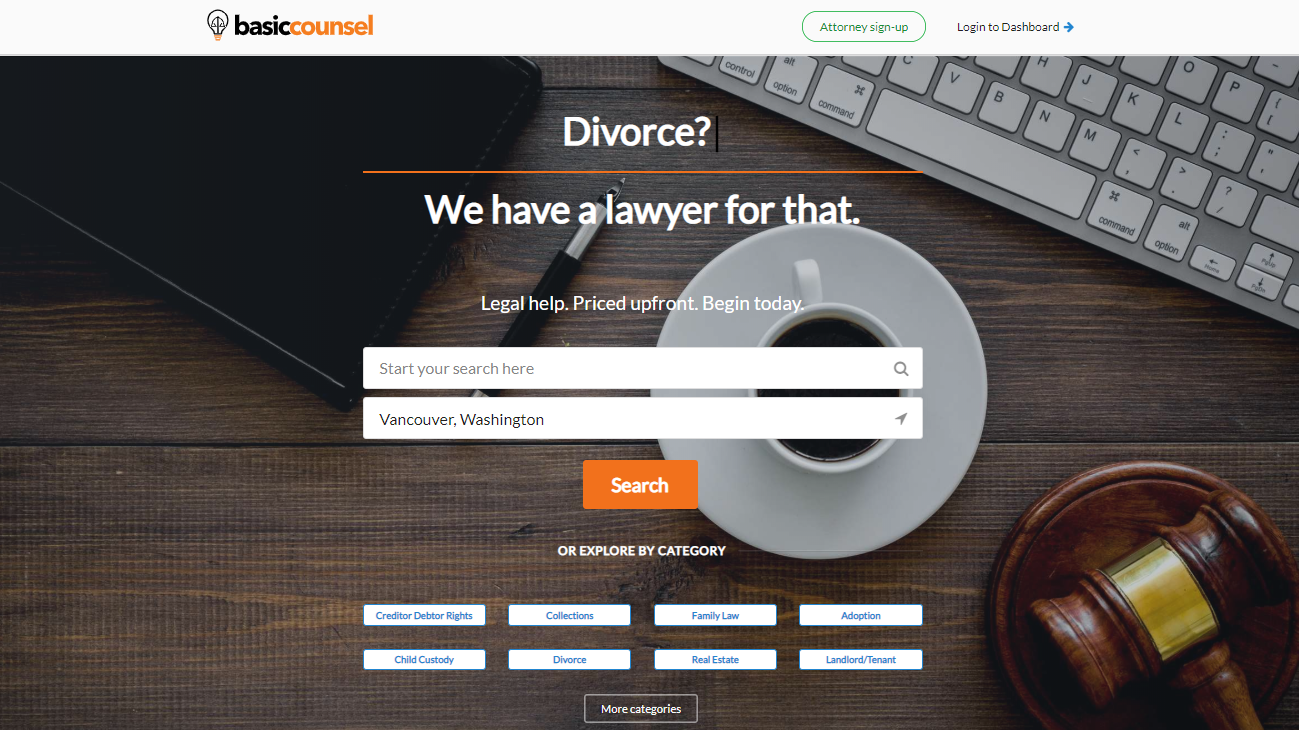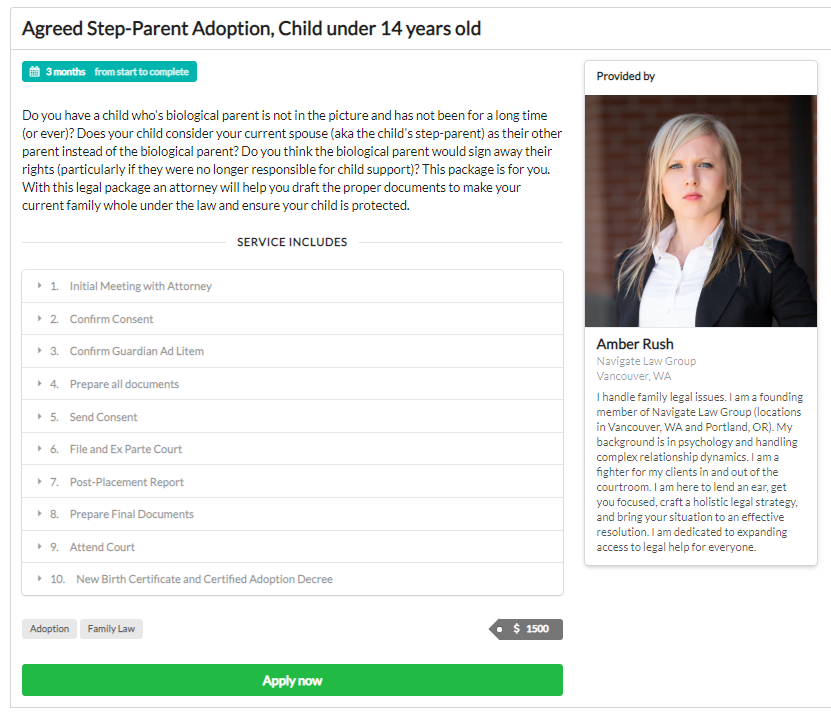In July, six months after acquiring Avvo, Internet Brands said it was shutting down Avvo Legal Services, the controversial program that provided fixed-fee, limited-scope legal services through a network of attorneys and that had raised the ire of many an ethics regulator.
Now a new site is enabling attorneys to offer a similar array of flat-fee, limited scope services, but with differences that the site’s founders believe make it compliant with every state’s professional conduct rules. “I think we’re on the right side of all the ethics opinions,” says cofounder Eli T. Marchbanks, a lawyer in Vancouver, Wash.
The site is called Basic Counsel, and although it went live last month, it remains in a beta phase, as its developers test both the platform and the market. While lawyers anywhere in the country can sign up to participate, the site is currently focusing its marketing efforts in Oregon and Washington before expanding more broadly.
Basic Counsel bills itself as “legal help with no surprises.” Consumers know up front what it will cost to purchase a service, what is included within the scope of the service, and how long it will take the lawyer to perform the service. Throughout the duration of the service, clients are kept informed as the attorney completes each phase.
“A big problem with limited-scope services is that clients do not understand the scope,” Marchbanks says. “This shows the scope and when the service has reached 100 percent completion.”
Unlike Avvo Legal Services, which set the price and scope of the services attorneys provided, Basic Counsel leaves that to the attorneys. Attorneys design the packages they will offer through the site, set the prices for their packages, and define the scope and stages of each package.
How It Works
Consumers search or browse the site for the service they need in the location they need it. When a consumer buys a service, the fee is sent directly to the lawyer, via the Stripe payment processing service. Basic Counsel collects a separate “platform fee” from the consumer of 5 percent of the service cost (with a $10 minimum).
Marchbanks founded the site together with Amber M. Rush, his partner in his Washington law practice and CEO of Basic Counsel, and two developers. They have been developing the concept for the site since before Avvo Legal Services launched, he says. Their goal was to develop a better and more transparent way for consumers to shop for legal services and for attorneys to commoditize at scale the cookbook-type services they provide. Ultimately, they believe, their platform could help narrow the gap in access to justice.
In posting packages to the site, attorneys are asked to outline and describe the steps involved in performing a service. These outlines serve two purposes. They help consumers understand the scope of a service before purchasing it. And, once the service is purchased, the outline keeps both the client and the attorney informed of the progress of the matter.
Both the client and the attorney can track and manage their cases through a dashboard. The steps outlined for the service are added to the dashboard and the system reminds attorneys of tasks due to be performed. Once the task is performed, the attorney checks a box and the client is notified automatically. That may trigger a next step for either the client or the attorney. In this way, the platform functions as a project-management tool, Marchbanks says.
An attorney can modify steps or timelines “within reason,” Marchbanks says, but the attorney must adhere to the quoted fee.
The dashboard can also be used by both attorney and client to share documents and exchange messages.
For now, the site supports only flat-fee billing. Marchbanks says the plan is to add support for hourly and contingent fee services. The company is also working on allowing attorneys to create add-on packages that would be associated with basic packages.
Marchbanks also foresees building integrations with third-party document management platforms, practice management platforms, and other applications.
Avoiding Ethics Issues
With regard to the potential ethics issues raised by a site such as this, Marchbanks says he has put extensive work into researching ethics issues and helping to ensure that the site operates in a way that is compliant with ethics rules and opinions.
For Avvo Legal Services, a concern of ethics bodies was that Avvo set the fee and defined the scope of the service. On Basic Counsel, the lawyer sets the fee and defines the scope.
(I summarized the ethics concerns involving Avvo Legal Services in this post.)
Another ethics concern with Avvo Legal Services was that it collected the fee from the client and held it until the service was completed, which some said interfered with the lawyer’s duty to safeguard client funds. On Basic Counsel, the funds go directly to the lawyer.
Still another ethics issue for Avvo Legal Services was that it charged the lawyer a marketing fee, which some ethics bodies saw as fee splitting. Basic Counsel charges the client a platform fee, and Marchbanks says the fee is for the direct benefits the client obtains from using the platform — not for anything the attorney provides.
Basic Counsel verifies that attorneys who apply to participate in the service are licensed to practice. It does not attempt to vet the quality of a lawyer’s services. Clients are able to rate attorneys on a scale of 1-5, but they can rate attorneys only for the specific packages they have purchased. Those ratings are then available to others considering the attorney.
Bottom Line
As noted at the outset, the site launched just last month and is still in a beta stage of testing the platform and the market. Lawyers’ listings remain few and are mostly in Washington and Oregon. That said, lawyers anywhere in the U.S. are welcome to sign up and add projects. There is no cost to join.
Earlier this year, I wrote about the report of the Illinois Attorney Registration and Disciplinary Commission that recommended loosening rules on attorneys’ participation in sites such as Avvo Legal Services. Such sites, the report said, serve the dual purposes of helping address unmet legal needs for low- and moderate-income consumers and of providing more work for underemployed lawyers.
Basic Counsel has the potential to do the same. It allows consumers to shop for and purchase services tailored to specific needs, to understand in advance the scope and price of the service they are purchasing, and then to remain informed of progress and next steps throughout the performance of the service.
For attorneys, it could provide a new way to commoditize and scale services that can be delivered in a standard workflow, and thereby bring in new clients and revenue. That adds up to a win for both consumers and attorneys.
 Robert Ambrogi Blog
Robert Ambrogi Blog
